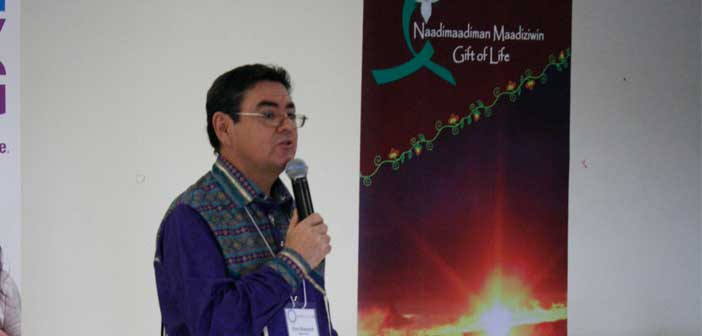Liver recipient seeks to increase participation rate
WIKWEMIKONG—Wikwemikong elder Chris Pheasant is a grateful man. He is grateful to be able to watch the sun rise in the morning and to see it set in the evening, because it was just a few short months ago that watching each of those events might well have been his last. Mr. Pheasant is particularly grateful to the person whose gift of a liver gave him a second lease on life.
Mr. Pheasant spoke about the Gift of Life (organ and tissue donation) at the Mino Gwekwaaziiwin Wikwemikong World Diabetes Day conference last week.
Although he described himself as “a patient for life” due to the necessity of maintenance of his liver donation, he described that as a gift as well, relating the story of a recent trip to the hospital in southern Ontario where he receives his treatment. “As I walked past room number 7, my old room, I saw a man who looked like I looked when I came in, bloated,” he said. “I had a bit of a flashback. So I went in and said hi.”
The popular Manitoulin teacher, elder and powwow emcee spoke about the outpouring of love that he experienced from his own community of Wikwemikong and from communities across Manitoulin Island and the province. “I started to look at my life again,” he said. “I asked myself, ‘what am I supposed to do now that I have a second life?’”
He told the audience about how his body had sunk lower and lower until he arrived at the hospital in southern Ontario with his spirit barely hanging on to his body. “But as your body gets weaker, your spirit gets stronger,” he said. “Things started to happen to me and I thought, ‘nahow (okay), it must be time.’”
But it wasn’t his time to greet the sun for the last time and as he lay in his bed on the long road to recovery he began to reflect on the many people who were sending him get well cards and messages. “I never realized how many people I had contact with,” said Mr. Pheasant.
He decided to bring the message of the importance of providing the gift of life to others, especially to the Anishinaabe, for whom organ donation numbers are very, very low. Mr. Pheasant described the decision to allow organ donation from a child as one of the hardest for a bereaved parent to make, but among the most important gifts of life that can be made. “We need to make that decision easier for our loved ones to make,” he said. “Kids have a choice,” he said. “You can register with the Gift of Life, make your decision known so it makes it easier for your loved ones if that time comes.”
Studies have shown that donating the organs and tissue of a loved one can provide immediate comfort and long-lasting consolation to family members in their grief, he said.
Mr. Pheasant said that he had a dream, a vision, where he saw the land. “Our bodies are of the earth,” he said. “When we die, we go back to the earth and our spirits go on to be with the Creator.” The liver that is now part of his body, he said, will one day return to the earth. “We need to reach out, to talk about it with our families,” he said. “Make your wishes known.”
The need for organ and tissue donations is very large, he pointed out. “You would be amazed at how many people in Wiky will benefit,” said Mr. Pheasant as he explained that one organ donor can save up to eight lives through organ donation and improve the lives of as many as 75 others through tissue donations.
Organs that can be donated include the heart, liver, pancreas, lungs, small bowel, corneas, heart valves, bone, skin and eyes.
“You are never too old,” said Mr. Pheasant. “The oldest Canadian organ donor was 90 years of age and the oldest tissue donor was 102.”
Mr. Pheasant concluded by saying he was grateful for the Gift of Life he had received and also for the support of the Wikwemikong Health Centre for the brochures and displays that he used in his presentation.
The Trillium Gift of Life Network can be contacted at 1-800-263-2833 or online at www.giftoflife.on.ca or www.nan.on.ca.



